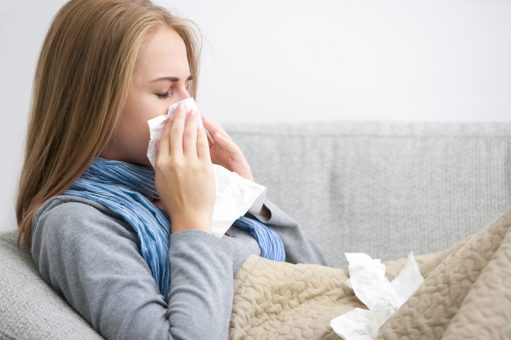HEALTH BLOGS BY FITBYNET
Top Tips To Prevent Seasonal Flu
People who are exposed to cold and flu germs every day — doctors, flight attendants, teachers — know a thing or two about how to stay healthy when everyone around them is sick. Their suggestions can help you, too.
To help you stay safe and prevent seasonal flu, here are a few tips you should follow.
1. Cover your nose and mouth while sneezing/coughing
The virus can spread from a person to others through coughing, sneezing or coming in contact with contaminated surfaces. It is wise to use disposable tissues instead of a handkerchief if you have a cold or a cough as you can dispose the tissue after use. Avoid reusing your handkerchief. Also, when you cough, don’t cup your hands around your mouth. Cough into your elbow instead. It’s recommended to wash hands after a sneeze or a cough to get rid of potential contamination.
2. Wash your hands frequently
No matter what line of work you’re in, if you come in contact with people who are contagious, you have to wash your hands over and over, says Alan Pocinki, MD. Pocinki practices internal medicine at the George Washington University Hospital in Washington, DC.
“Wash your hands as much as you can stand, and then some more — especially after wrapping up a visit with someone who’s sick,” Pocinki says.
It sounds so simple, but soap and water are the constant companions of doctors and nurses. To completely get rid of viruses from your skin, you need to scrub hard for 20 seconds or more. A good way to time yourself is to sing “Happy Birthday” twice while scrubbing the backs of your hands, between your fingers, and under your nails. It doesn’t matter if the water’s hot or cold — the very act of scrubbing will physically remove the germs.
3. Use a hand sanitizer
It is advised to carry a hand sanitizer as it comes handy especially when you don’t have access to water and soap. If a person suffering from flu touches your personal belongings or if you have touched pens or door handles, it is wise to use a hand sanitizer as these might be loaded with germs. Also, avoid shaking hands with a person who is sick as the chances of transmission are higher. In such cases, using a sanitizer is the best bet.
4. Avoid touching the eyes/mouth/face
Keep your hands off the face. Also avoid any temptation to touch your eyes, nose, or mouth too frequently as it can increase the risk of viral transmission within your body leading to diseases like conjunctivitis, respiratory tract infections, etc. If you come in close contact, share any objects or shake hands with people suffering from seasonal flu, there are chances of viral transmission. If possible avoid these contacts and if you get in contact with a sick person do not forget to wash your hands.
5. Wear respirators or masks
Face masks, also known as respirators are one of the effective ways to prevent the transmission of the flu virus and other seasonal viruses. The Center for Disease Control and Prevention (CDC) recommends that people who are at a high risk of suffering from flu such as a vulnerable population or caregivers should use face masks. Also, if you are sick, then it is advised to wear a face mask to prevent the spread of the illness. Also for some specific viral infections like ‘Swine Flu’ specific respirator masks, known as N95 masks, are recommended.
6. Avoid crowded places
It is best to stay out of crowded places as far as possible. This is because, close proximity with sick people, especially people who have flu, heightens your chances of getting flu. If you have to get out in public, then try to maintain a distance of at least six feet to avoid airborne transmission. Children, less than five years and elderly individuals should avoid crowded places as they are at high risk. Also, if you feel sick it is better to stay away from school/work to prevent the spread of the infection.
7. Boost your immunity
In order to prevent seasonal flu and protect yourself from the flu virus, it is important to boost your immunity. It is advised to drink loads of water and eat a balanced diet, preferably home-cooked food. Add lots of fresh fruits and vegetables to your diet as it provides essential nutrients such as vitamins, minerals, and antioxidants, which strengthens your immune system and helps you to fight diseases. You can even try dietary nutritional supplements to boost your immunity and prevent flu.
8. Avoid getting close to people who are sick.
For example, don’t shake hands.
“Doctors tend to be very cautious about hand shaking,” says Terri Remy, MD, medical director of Medical Associates at Beauregard in Alexandria, VA. “Just explain, ‘To keep transmission of colds and flu down, I’m not shaking hands. But hello! Nice to meet you!’ They understand.”

